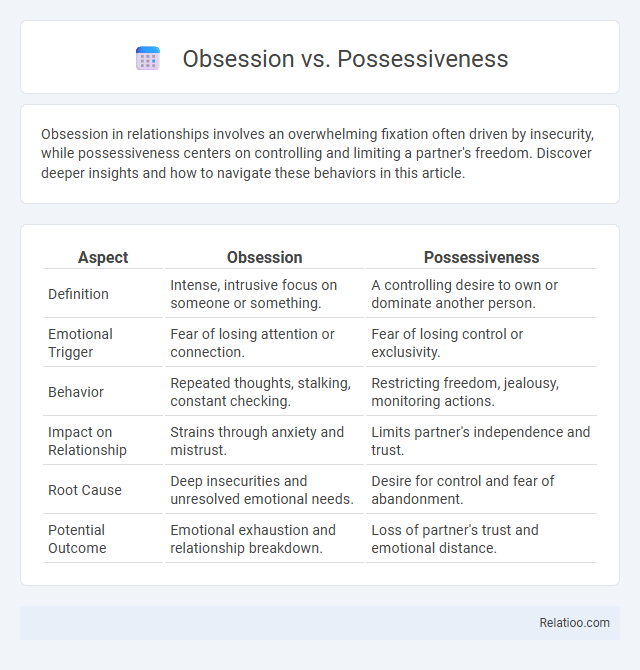Obsession in relationships involves an overwhelming fixation often driven by insecurity, while possessiveness centers on controlling and limiting a partner's freedom. Discover deeper insights and how to navigate these behaviors in this article.
Table of Comparison
| Aspect | Obsession | Possessiveness |
|---|---|---|
| Definition | Intense, intrusive focus on someone or something. | A controlling desire to own or dominate another person. |
| Emotional Trigger | Fear of losing attention or connection. | Fear of losing control or exclusivity. |
| Behavior | Repeated thoughts, stalking, constant checking. | Restricting freedom, jealousy, monitoring actions. |
| Impact on Relationship | Strains through anxiety and mistrust. | Limits partner's independence and trust. |
| Root Cause | Deep insecurities and unresolved emotional needs. | Desire for control and fear of abandonment. |
| Potential Outcome | Emotional exhaustion and relationship breakdown. | Loss of partner's trust and emotional distance. |
Understanding Obsession: Definition and Signs
Obsession is an intense, persistent preoccupation with a person, idea, or thing that dominates Your thoughts and emotions, often leading to compulsive behaviors. Unlike possessiveness, which involves a desire to control or own someone, obsession frequently triggers anxiety, intrusive thoughts, and difficulty focusing on other aspects of life. Recognizing signs such as repetitive thinking, emotional distress when separated from the focus, and neglect of personal responsibilities helps in understanding the deeper psychological impact of obsession.
What Is Possessiveness? Key Characteristics
Possessiveness is an emotional state characterized by an intense desire to control or dominate someone or something, often stemming from fear of loss or insecurity. Key characteristics include jealousy, controlling behavior, and a tendency to restrict the freedom of the person or object involved. Unlike obsession, which implies persistent preoccupation, possessiveness centers specifically on ownership and the need to maintain exclusive rights over a relationship or possession.
Core Differences: Obsession vs Possessiveness
Obsession involves an intense fixation on a person, idea, or object that dominates your thoughts, often leading to compulsive behaviors. Possessiveness, on the other hand, is rooted in the desire to control or own someone, reflecting insecurity and fear of loss, which can strain relationships. Understanding these core differences helps you recognize when emotions shift from healthy concern to unhealthy control.
Psychological Roots of Obsessive Behavior
Obsessive behavior stems from deep psychological roots such as anxiety, insecurity, and unmet emotional needs, distinguishing it from mere possessiveness or obsession. While possessiveness often arises from fear of loss or control, obsession involves intrusive and repetitive thoughts that disrupt your emotional balance. Understanding these differences can help you address the underlying causes and promote healthier mental well-being.
The Emotional Triggers Behind Possessiveness
Possessiveness stems from deep emotional triggers such as insecurity, fear of abandonment, and low self-esteem, which distort Your perception of relationships and create unhealthy attachment patterns. Unlike obsession, which centers on intrusive thoughts, possessiveness emphasizes control and dominance over a partner to alleviate personal anxieties. Recognizing these emotional underpinnings is crucial for addressing possessive behavior and fostering healthier emotional bonds.
Impact on Relationships: Obsession vs Possessiveness
Obsession in relationships often leads to intense focus on a partner that can stifle individuality, while possessiveness manifests as controlling behaviors driven by insecurity and fear of loss. Obsession may create emotional dependency, making it difficult for your relationship to maintain healthy boundaries and personal space. Possessiveness damages trust and autonomy, fostering resentment and conflict that threaten long-term connection and emotional well-being.
Recognizing Healthy Attachment vs Unhealthy Patterns
Recognizing healthy attachment involves understanding boundaries, respect, and mutual trust, whereas unhealthy patterns like obsession and possessiveness manifest through controlling behavior, anxiety, and a lack of personal autonomy. Obsession often leads to intrusive thoughts and fixation on a partner, while possessiveness is marked by jealousy and attempts to limit their freedom. Differentiating these dynamics is crucial for maintaining balanced relationships and emotional well-being.
How to Address Obsession in Yourself or Others
Addressing obsession in yourself or others requires recognizing obsessive behaviors early, such as excessive preoccupation with a person or activity that disrupts daily functioning. Implementing cognitive-behavioral strategies, setting clear boundaries, and seeking professional therapy can help manage underlying anxiety and control impulses effectively. Monitoring emotional responses and fostering healthy coping mechanisms reduce the risk of obsession escalating into possessiveness or harmful patterns.
Overcoming Possessiveness: Effective Strategies
Overcoming possessiveness involves recognizing underlying insecurities and building trust through open communication and self-awareness. Developing healthy boundaries and fostering emotional independence can reduce the need for control in relationships. Practicing mindfulness and seeking therapy or counseling helps individuals shift from possessiveness to secure attachment patterns.
Seeking Help: Therapy and Support Options
Obsessive and possessive behaviors often indicate deeper emotional challenges that therapy can effectively address, offering tailored strategies to manage thoughts and actions. Seeking professional support, such as cognitive-behavioral therapy (CBT) or counseling groups, provides You with tools to understand triggers and develop healthier relationship patterns. Support options also include mediation and family therapy, which foster communication and promote emotional well-being.

Infographic: Obsession vs Possessiveness
 relatioo.com
relatioo.com